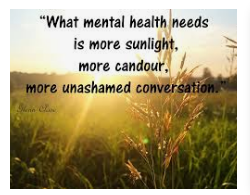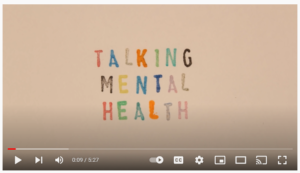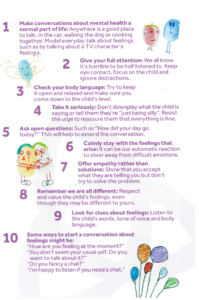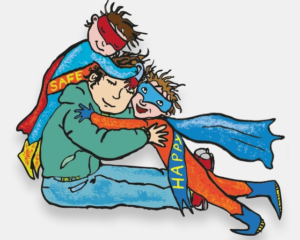Talking about Mental Health

“For everything you are feeling, there is a way to express it.” (The Thirteenth Doctor, Jodie Wittaker)
Guidance for parents for starting conversations around Mental Health:
Talking about Mental Health animation (KS2 especially- Y3-Y6)

https://www.youtube.com/watch?v=nCrjevx3-Js
You’re never too young to talk about mental heath leaflet (EYFS & KS1)

NHS advice on talking to children about feelings
Further resources to encourage discussion around mental health:
Exploring emotions: https://www.ollieandhissuperpowers.com/

If you have a few minutes, this song“You will be found”from the show “Dear Evan Hansen” can be comforting, uplifting and life-affirming. It re-inforces how we are not alone and how speaking up and talking about mental health can bring real benefits.

Talking about War and Conflict
When war or conflict is in the news, it can cause feelings such as fear, sadness and anxiety for children, young people and adults. The following advice is from Place2Be:
As teachers, parents and carers, it is impossible to protect children from frightening and confusing world events, such as war and conflict.
We can, however:
- Create a sense of safety at home and school
- Find ways to cope together with uncertainty
- Be hopeful for peace and safety for all
- Be compassionate
- Look after our own wellbeing and seek support as we support others
When talking to children and young people about war, it is important to take into account their age, stage of development and whether they have special educational needs, additional support needs or other needs that may make them more vulnerable.
Here are some things you may find helpful:
- Try to find out what your children already know about the situation, and how they found out about it. Reinforce the importance of getting their news from a reputable source, such as the BBC. You could look at reliable news sources together.
- Encourage young people to access a range of media content that they normally enjoy. This will help guard against overexposure to news and ‘doom-scrolling’.
- Children may be exposed to explicit images that can trigger fear responses. Let them know that you are open to talking about what they have seen or heard.
- Be open to talking with children about the war, but say that you may not have all the answers. If you are unsure, say that you don’t know. Acknowledge uncertainty and validate the feelings that arise from uncertainty. For example, “It sounds like you are unsure and are worried about what could happen next”.
- Young children may not talk directly about war, but their fears might come out in play. You can join their play to help them explore their feelings.
- Ask children about their feelings about the war. For example, they may feel worried, frightened, angry or confused or a whole range of other emotions. Listen to their feelings and acknowledge them as valid, rather than minimising them.
- At the same time, reassure your child that parents and carers at home, and teachers at school, are there to keep them safe and that many people around the world are working hard to try to resolve the conflict.
- Encourage children to think about the things they can be more certain about and influence, and to look after their own wellbeing. For example, they can still play, learn, be with their friends, listen to music, play sport etc.
- Children with existing mental health needs and/or SEND/ASN may need some extra support. This resource from Phoenix Education Consultancy may be useful.
- Children who have family and friends in war-torn countries may feel particularly upset. Children from all communities will need compassion, support and to feel safe. You may need to monitor how people in school (and beyond) are responding to classmates, colleagues and families from the communities most directly affected.
- Be aware of children and families who are refugees and have fled conflict, as recent events may be particularly poignant for them.
- If children want to help, encourage their concern and compassion. This might include raising funds, campaigning for peace, posting messages of hope etc.
- Children who have members of their families in the armed forces are likely to fear for the safety of their loved ones. Be mindful that these children may need additional space, time and support. Further information and resources are available from Little Troopers.
Children’s ability to cope is influenced by their teachers, parents, carers and other important adults in their lives. It is important that you look after your own mental health and seek support if you feel overwhelmed.
- Shout Text Helpline, text CONNECT to 85258 to contact Shout for free, 24/7.
- Education Support Partnership Helpline, call 08000 562 561 or text 07909 341229 for free, 24/7.
- The Young Minds Parents Helpline, call for free on 0808 802 5544 (9.30am – 4pm, Monday-Friday, UK)
Further guidance can be found via the links below:

https://www.unicef.org/parenting/how-talk-your-children-about-conflict-and-war

https://www.savethechildren.org.uk/blogs/2022/how-to-talk-to-children-about-war
Talking about Covid 19
Talking to your child about Coronavirus – from Place 2B
Talking to your child about Coronavirus – from Young Minds
Talking to children about illness – guidance from BPS
The following might be a good stimulus to talk about your child’s feelings:
Coronavirus: A Book for Children, illustrated by Axel Scheffler


